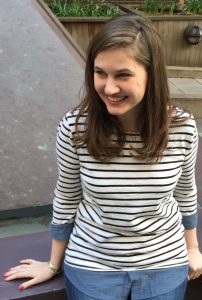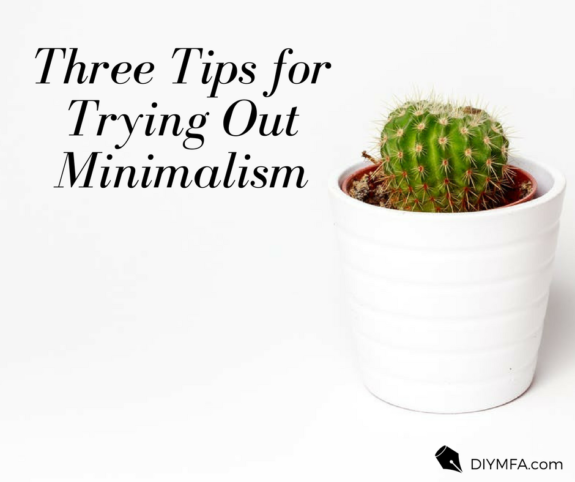In my last article, I talked about my experiment with de-cluttering, and the benefits of minimalism, specifically, for writers. While I’m still not quite done, I have already been able to see a lot of positive results. Thinking about trying out minimalism? Here are three tips for getting started:
1) Write Down Your Motivations
The process of de-cluttering can take a while, and it’s easy to lose sight of why you’re doing it. Before I actually set about the process, I made a plan, but I also wanted a reminder of my motivations. At the top and bottom of the list, I wrote two quotes that, for me, summed up why I wanted to de-clutter my space. First was a Bible verse, Matthew 6:20-21: “But store up for yourselves treasures in heaven, where moths do not destroy, and thieves do not break in and steal. For where your treasure is, there your heart will be also.” It applied equally to my faith, my creative pursuits and my relationships–the things I say are most important to me. The question, of course, is does my life reflect that?
That brought me to the second quote. It’s from one of my favorite books on writing, Mary Oliver’s Upstream. At the end of the first chapter, she writes “Attention is the beginning of devotion.” What we pay attention to is what we truly value. I wanted to gain more focus: from my phone, from my email, from social media and Netflix, so I could act more intentionally on the things I say I care about. Chief among these, of course, is writing, but also my job, health, relationships, faith, finances and knowledge.
Minimalism isn’t one-size-fits all. In fact, it’s the exact opposite. If you’re considering trying it out, ask yourself what you hope to achieve and why. Envision your space. Envision your life. There’s no right or wrong answer–just the one that fits what matters most to you! For me, having quotes that crystallized my motivations was helpful. In The Life Changing Magic of Tidying Up, Marie Kondo asks her readers to envision the space they want to live in. Do what works for you!
A lot of the benefits of this de-cluttering process were secondary to my original goals, but I do think it’s important to ask yourself why you want to de-clutter and–more importantly–what you hope to achieve. Inevitably, the space you inhabit becomes a reflection of the life you’re leading, which is a reflection of your priorities.
2) Make a De-Cluttering Plan
There are a lot of different ideas about how to go about becoming a minimalist. Ryan Nicodemus and Joshua Fields Milburn, “The Minimalists” have two suggestions. The first is a thirty day “minimalism game,” wherein you discard one item on day one, two on day two, and so on and so forth. Another method they used is a “packing party,” where you pack up everything you own (or everything in a room, or even a drawer) as if you were moving. Then, you only unpack things you use.
Marie Kondo has a different method. Her idea is that you only need to de-clutter once if you do it right. And the way to de-clutter is by category. So, for example, you de-clutter all of your clothing at once. Literally. You pull out every shoe, every winter coat, every article of clothing you own and go through them all at once, as opposed to going through your things closet by closet.
In my minimalism experiment, I didn’t exactly do any of these methods, with mixed results, which I’ll talk more about in detail in my next article. I de-cluttered partially by category, and partially by furniture. This was in part because I had already de-cluttered once, so I didn’t really need to do a big haul. But having a plan–not only of what I needed to de-clutter, but when I was going to do it, helped me to get the job done in a timely manner.
One thing I would suggest–give yourself a reasonable, but tight time limit. For me, a month was sufficient, because I have a pretty small apartment. It might be longer, depending on the size of the space. But having a given amount of time to work through the de-cluttering process helps ensure that it will actually get done.
3) Leave Room for Inspiration
Minimalism isn’t about what you throw away: it’s about what you keep. It’s about designing a life that reflects what you value. De-cluttering is a way of clarifying this. It’s a process. The real benefits of minimalism happen along the way.
As I was de-cluttering and simplifying my space, I had a lot of ideas about how I could go about simplifying the rest of my life, and focusing on the important things. Some were obvious, like going to the gym, cooking and hosting more, turning off my phone and reading before bed. Others, though, were not things I’d thought of before.
For example, having a quiet, calm space made me think more about how hectic living in New York is. This is a constant struggle for me, but I’ve written it off as something I can’t fix. However, as I was de-cluttering, I started thinking about ways to carve more quiet even in the midst of chaos. Time and space for reflection are important to me, and the constant busyness and craziness of New York, especially the subway, make finding peace and quiet impossible. I can’t change where I live, but was there something I could change? It occurred to me: what if I tried walking to work?
At first, the idea wasn’t appealing. It meant adding half an hour to what is already a pretty long commute. But, if I were able to make it work, I’d build in quiet time as well as exercise, avoid the stress and annoyance of the subway and save money. I decided to give it a try. Almost a month later, I’m hooked on this new habit.
As you’re de-cluttering, leave room to experiment with other ways to simplify and enrich your life, as these ideas come to you. I recently read this article, about experimenting with new habits, and found it extremely helpful for putting this idea in perspective. Joshua Fields Milburn also talks about this in his book, Everything That Remains. He experimented with not having home internet, not having a cell phone, and even went a whole year without buying anything. That might be extreme for most people, but I bet there are other ideas that will come to you as you are de-cluttering. The point isn’t that you have to stick to these habits. It’s giving yourself the freedom to try them out.
Have you experimented with minimalism? What were your methods? Let me know in the comments!

Check out her editorial services and connect with on Instagram.







